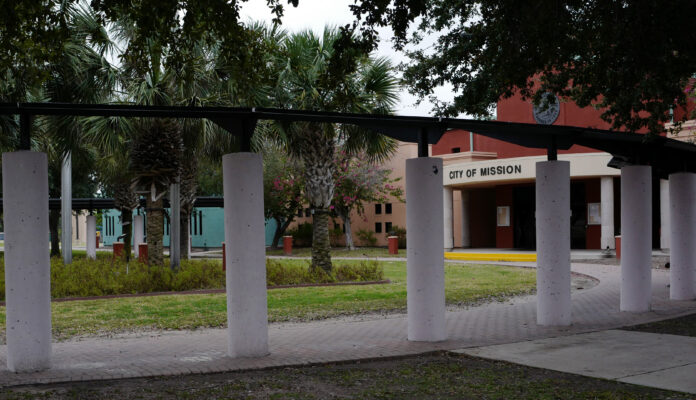
A state district judge will continue to block the city of Mission from making payments to Performance Services Inc., an energy-savings company that was linked to a bribery scheme currently under federal investigation, after the judge ruled he had jurisdiction over the case.
During a hearing Tuesday, state District Judge Noe Gonzalez granted a temporary injunction filed against the city at the request of former Mission Mayor Norberto “Beto” Salinas.
In August 2021, Salinas filed a lawsuit against the city, accusing them of violating state law for allegedly not following the proper procurement process when it awarded the contract to Performance Services Inc., or PSI, a company based in Indiana but with offices in nine other states including Texas.
By a split vote of the city council, the city agreed to award a contract to PSI for a project to replace water meters and install LED lighting in June 2020. Then in March 2021, they authorized financing for the project at a cost of $17.2 million.
Now, PSI is at the center of a federal investigation that has resulted in at least three officials from western Hidalgo County pleading guilty to participating in a kickback scheme.
Among the allegations that surfaced from the federal investigation are that an employee from PSI conspired with elected officials to obtain a contract from governmental entities in exchange for kickbacks.
At an injunction hearing held last week in the state case, an attorney for PSI, Jane M. N. Webre, argued that even if a contract is found to be voidable that does not automatically make it void.
While denying any criminal actions or wrongdoing on the part of PSI, Webre argued that even if the contract was approved in an illegal manner, state law says the city retains discretion to void the contract or not.
“ The fact of a conflict or a bribe or a conspiracy … the fact is that Texas law in the Texas Local Government Code, Chapter 171 and Chapter 176, and the Mission city ordinances say that it’s to the city to decide what to do with a contract like that,” Webre said.
During Tuesday’s hearing, Gonzalez said he had reviewed the case law the PSI attorneys presented and posited that those were examples of when a city commissioner or council member has a clear conflict of interest with a company and different from when a company actually bribes them for votes.
When a conflict of interest is discovered, the judge said, the public officials can go back and vote to ratify a contract or void it.
“But when the allegation is that from the onset, the votes are obtained illegally through a bribe, then the issue becomes, is it really a vote?” Gonzalez said. “You’re arguing that it is, but a vote can only be taken by a public official under its oath, and the oath says that he has not taken anything or she has not taken anything in return for votes and will not.”
Gonzalez continued, “The problem that I have with this whole thing is, if what you’re saying is correct, I would have to believe that there’s a niche in the law that allows for an illegal act to occur in the creation and that we must ignore it and allow the same people that may have participated in it to try to correct it and that doesn’t sit well.”
Based on that reasoning, he ruled that the court did have jurisdiction to hear the case and ruled to grant the injunction against the city, preventing them from making payments to the company and stopping work on the project.
However, he was open to the 13th Court of Appeals disagreeing with his ruling and believed the appellate court would quickly take up the case.
The judge also took up the issue of bond, which Salinas must pay in order to secure the injunction order.
Greg Mizell, PSI’s operations manager for its Texas team, testified about how much the company would accrue in damages during the injunction.
He estimated that over a six-month injunction period, PSI would incur $293,135 in damages and therefore the attorneys argued that the bond be set at that amount.
Gonzalez ultimately set the bond at $75,000, calculating damages for a 60-day injunction period instead.
Ricardo “Rick” Salinas, son and attorney for Beto Salinas, said he would have to confer with his father to see whether he could actually post the bond.
The judge tentatively set a trial date for Aug. 12.




